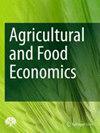全球粮食安全对人造肉的接受:系统文献综述及未来研究方向
IF 4.5
2区 经济学
Q1 AGRICULTURAL ECONOMICS & POLICY
引用次数: 1
摘要
摘要:人造肉是一种基于新技术的肉类替代品,有可能为不断增长的世界人口补充蛋白质供应。越来越多的消费者研究机构调查了消费者接受人造肉的个人因素。然而,对影响各国消费者反应的文化和经济驱动因素的研究却很少。鉴于此,本文旨在提供一个跨文化视角的培养肉接受,并指导该领域未来的实证研究。首先,本文提出了一个框架来解释人造肉接受度的跨国差异,包括社会因素(即文化和宗教)、食品环境指标(即肉类生产和消费)和经济市场参数(即国内生产总值、二氧化碳排放和人口增长)。其次,本文采用了系统的文献综述,包括105个与培养肉相关的实证消费者研究。第三,根据提出的框架对已识别的论文进行分析。这一描述性分析的结果表明,迄今为止的实证研究主要是在生产和消费大量肉类并以人均国内生产总值高为特点的国家进行的。在这些被调查的国家中,许多国家都有世俗理性和自我表达的文化价值取向。其他国家类型尚未得到充分开发,尽管它们代表了未来培养肉的潜在相关目标市场。旨在解释国家间差异的跨文化研究很少。为了指导未来的研究,本文提出了有关社会因素、食品环境和市场相关因素对各国消费者接受培养肉的研究主张。本文章由计算机程序翻译,如有差异,请以英文原文为准。
Cultured meat acceptance for global food security: a systematic literature review and future research directions
Abstract Cultured meat is a novel technology-based meat alternative with the potential to complement protein supply for a growing world population. An increasing body of consumer research has investigated personal factors explaining consumers’ acceptance of cultured meat. Research on cultural and economic drivers impacting consumer responses across countries, however, is scant. In this light, this article aims to provide a cross-cultural perspective on cultured meat acceptance and guide future empirical research in this domain. First, this article proposes a framework to explain cross-national differences in cultured meat acceptance comprising societal factors (i.e., culture and religion), indicators of the food environment (i.e., meat production and consumption), and economic market parameters (i.e., gross domestic product, carbon dioxide emissions, and population growth). Second, the paper applies a systematic literature review, including 105 empirical consumer studies related to cultured meat. Third, the identified papers are analyzed according to the proposed framework. The findings of this descriptive analysis demonstrate that empirical research to date has predominately been conducted in countries that produce and consume high amounts of meat and are characterized by high gross domestic products per capita. Many of these surveyed countries harbor secular-rational and self-expressional cultural value orientations. Other country types have been less prominently explored, although they represent potentially relevant target markets for cultured meat in the future. Cross-cultural research aiming to explain differences across countries is scarce. To guide future research, the paper develops research propositions relating societal factors, food environment, and market-related factors to consumer acceptance of cultured meat across countries.
求助全文
通过发布文献求助,成功后即可免费获取论文全文。
去求助
来源期刊

Agricultural and Food Economics
Agricultural and Biological Sciences-Agricultural and Biological Sciences (miscellaneous)
CiteScore
5.50
自引率
5.10%
发文量
29
审稿时长
13 weeks
期刊介绍:
Agricultural and Food Economics (AFE) is an international peer-reviewed and open access journal published on behalf of the Italian Society of Agricultural Economics. AFE welcomes research articles from economists, scholars and researchers from all over the world to publish problem-oriented and high-quality articles. AFE publishes only original articles from a wide variety of economic perspectives that address current and relevant issues related to the agricultural and food system. AFE publishes articles focused on applied analysis, the discussion of innovative results, and relevant policy and managerial implications. AFE seeks clearly written articles from experts in the field, to promote insightful understanding of the current trends in the agri-food system. Topics of specific interest to AFE include agricultural and food market analysis, agri-food firm management and marketing, organization of the agri-food chains, consumer behavior, food quality and safety issues, economics of nutrition and food security, food and health economics, agri-food policy and trade, sustainable rural development, natural and marine resource economics and land economics.
 求助内容:
求助内容: 应助结果提醒方式:
应助结果提醒方式:


